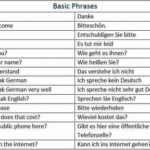 Most consonants in German are pronounced differently than in English. It is quite obvious with the consonants l and r.
Most consonants in German are pronounced differently than in English. It is quite obvious with the consonants l and r.
Difficulty Level: Average
Time Required: 20 min
Here’s How:
- Pronouncing l (like in “million”), place the tip of the tongue to the ridge behind the upper teeth.
- Flatten it to produce the German l sound which is much lighter and softer than its English namesake.
- Exercise pronouncing the l sound in German words “viel”, “lang”, “wollen”, “kalt”, “Bild”, etc.
- Pronouncing r, gargle slightly with uvula at back of mouth when r stands before a vowel like in German words “Rolle”, “beraten”, “Frau”, “Rad”, etc.
- When r is followed by a consonant, simply swallow it, using the neutral sound like in British English pronunciation of the word “here”.
- Exercise pronouncing the r sound in pre-consonant position in German words “vier”, “mir”, “studiert”, “Karte”, etc.
Tips:
- You should exaggerate certain lip and mouth configurations in order to pronounce German words correctly.
- Muscles of the mouth, lips, tongue, throat and neck must be much tenser for producing German sounds than English sounds.
- At the beginner’s level exaggerate the articulation until it becomes a habit.







